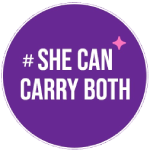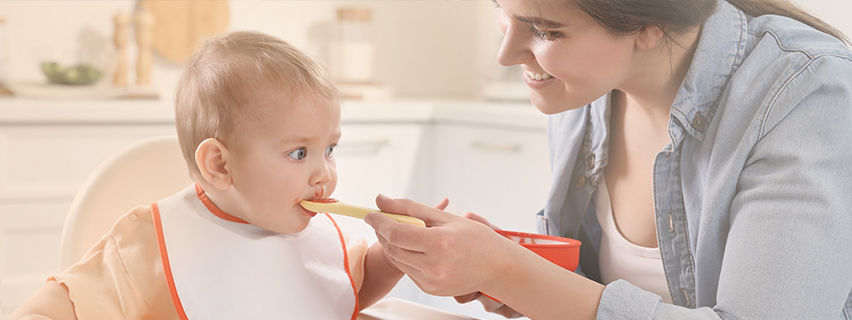Baby’s food: What, when and how to introduce nutritious solid food?
A mother’s constant worry is how to include healthy and nutritious food in their child’s diet. Your baby gets all the important nutrients from the breast milk for the first six months but after that, semi-solid and solid food should be introduced to meet the increasing nutritional requirement of your child in addition to the breast milk for proper growth and development. Try inculcating healthy food habits as soon as your child starts consuming solid food. It is very important to feed your child from each food group to fulfil their nutritional requirements for physical and mental development.
The food habits solely depend on what you feed them. So it’s very essential that their nutritional balance is maintained to prevent any kind of deficiency and chronic diseases.

What food should we introduce to your baby?
Different types of food should be included from a variety of food groups to meet the additional nutritional requirement of your baby as it reduces the risk of deficiency of nutrients and vitamins.
- Fruits and Vegetables- Fruits and veggies are excellent sources of vitamins, minerals and fibre. The vitamins and minerals present in the food make your baby immune to various kinds of chronic diseases and the fibre content is essential for the proper functioning of the digestive system which also helps in preventing constipation.
Apples, bananas and pears are amongst good sources of iron, magnesium and calcium but one should avoid citrus fruits like oranges, mandarin etc. till the baby is twelve months old to prevent acid reflux and body rash as these fruits are acidic in nature. Beans and lentils are a great source of fibre, potassium, iron and magnesium. Spinach has iron, vitamin C and vitamin A. Sweet potato is an excellent source of carbohydrates and carrots are rich in Vitamin A.
- Cereals and Pulses- Cereals are a good source of carbohydrates and energy whereas pulses are a very good source of protein, fibre and minerals like magnesium and potassium. Once a child is six months old, cooked pulses and cereals can be fed to the child in semi-solid form. Food like sweet and salty porridge, rice porridge, khichdi, pulse soup with mixed veggies etc can be very nutritious for your child.
- Dairy Products- Cow milk should be avoided till your baby is one year old as it contains an excessive amount of protein and minerals which could be harmful to them. Yoghurt can be introduced in small amounts but only with natural sweeteners. Always remember to consult with the paediatrician to find out whether your baby is lactose intolerant or not.
Now that we know what should be included in your baby’s diet, it is important for you to know when to introduce these food groups to your baby.
At what age should we start solid food?
Breastmilk fulfils all types of nutritional requirements of your child till six months, after that complimentary food items should be inculcated into your baby’s diet to meet the additional nutritional requirements. At this age, your baby takes a step towards adult food and gets to experiment with the taste buds. Your child’s digestive system gets ready at this age and there is no harm in introducing them to semi-solid food.
Once your baby starts their solid meals, it is important to note and practice precautions and safety measures to ensure that the feeding is done properly.
How to feed your baby?
Babies are prone to infection so one should be extra cautious while feeding them.
- Wash your hands before feeding your child to prevent any kind of contamination.
- Always keep in mind that if you are feeding them solid food, keep them in an upright position and not in a lying position.
- Feed them in small quantities at one time or it can increase the risk of choking.
- Don’t force-feed your baby or else they will start refusing everything and will get irritated. Let them guide you sometimes.
- Consult the paediatrician if your child refuses to intake any kind of solid food and keeps gagging and vomiting.
Apart from the measure on feeding your baby, you must also be aware of the know-how of the food preparation that should be as per your baby’s requirement.
How to prepare solid food for your baby?
Always keep consistency in mind while preparing solid food for your baby. Your child is learning to chew and swallow, make sure the food that you prepare for them is soft like mashed vegetables and fruits or porridge. It shouldn’t be too watery as it will lose all the vital nutrients and it shouldn’t be too thick either as it will get very difficult for the baby to swallow. Don’t put too much salt or sugar in your baby’s food as the food becomes less nutritious and increases the risk of diseases. Avoid adding artificial sweeteners to the food, use fruit pulp or jaggery instead. It’s very important to keep these things in mind while preparing food as it will help in developing healthy food habits in your baby.
When can babies drink water?
Your baby should only be fed breastmilk till six months as it provides all the essential nutrients and keeps them hydrated too. Intake of water before that can lead to water intoxication and overhydration. Even if your child turns six months old, water should be given in small quantities as too much of it is not good for the baby’s health. Make sure the water is boiled before being given to your baby. Moreover, water is not very essential until one year as the hydration requirement of your child is met through breastmilk and solid food which is given to them after six months.
What changes can we expect after your baby starts eating solid food?
First of all, your baby is going to make a lot of weird faces while intaking solid food for the first time. He might even refuse to accept it but don’t worry as your baby will take time to adapt to new tastes and flavours. Give them some time. You’ll also experience the change in the colour and texture of their stool as soon as they start intaking solid food. Your baby will also experience discomfort in their stomach which is normal but consult your doctor if the pain is too intense.
Apart from the above-stated information, there are a set of frequently asked questions that you should know.
FAQs
What is the first solid food that a baby should eat?
If it’s time to introduce solid food to your child, you should start with porridge. You can make porridge with cracked wheat or semolina.
What vegetable should a baby eat first?
If you are planning to include veggies in your child’s diet, start with pumpkin and carrots as their taste won’t be very surprising for the baby. Mash the steamed veggies and feed them in small portions.
Is banana a good baby food?
Yes! It’s a great source of fibre and potassium which is good for the digestive health of your baby and helps in weight gain.
How many times a day should I feed solid food to my six months old child?
As soon as your baby turns six months old, you can introduce solid food to their diet but milk is still the most crucial part of their diet so start with two meals a day and keep on adding gradually as your child grows.
In conclusion, mothers often worry about introducing solid food into their child’s diet but keeping these points in mind along with your and your doctor’s expertise, let your child experiment with new flavours and develop a taste of its own








































Leave a comment